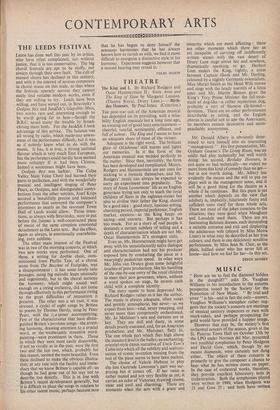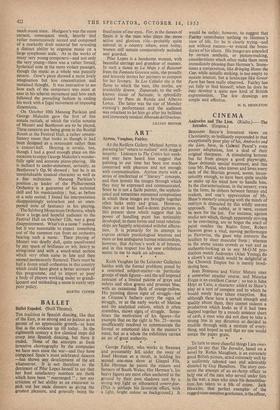MUSIC
" How are we to find the diamond hidden in the dunghill?" asks Dr. Vaughan Williams in his introduction to the autumn prospectus issued by the Society for the Promotion of New Music. " By trial and error " is his—and in fact the only—answer. Vaughan Williams's metaphor rather sug- gests that the society's concerts are meetings of musical sanitary inspectors or men with muck-rakess, and perhaps prospecting for gold would have provided a happier image. However that may be, the society's first orchestral concert of the season, given at the St. Pancras Town Hall on October 13th by • the LPO under Norman del Mar, presented two youthful symphonies by Peter Hodgson and David Gow, which, though by no means diamonds, were certainly not dung either. The object of these concerts is primarily to give the composer a chance to hear what he has written down on paper. In the case of orchestral works, therefore, they provide excellent laboratory tests in orchestration. Both the symphonies played were written in 1949, when Hodgson was 21 and Gow 25 ; and both have written
much music since. Hodgson's was the more earnest, consequent work, heavily and rather monotonously scored and composed of a markedly drab material but revealing a distinct ability to organise music on a large symphonic scale. As in the works of many very young composers—and not only the very young—there was a rather forced, hysterical note in the more violent passages, though the music as a whole was patently sincere. Gow's piece showed a more lively imagination but less concentration and sustained thought. It was instructive to see how each of the composers was most at ease in his scherzo movement and how each followed the prevailing fashion in ending his work with a fugal movement of imposing dimensions.
On October 10th Manoug Parikian and George Malcolm gave the first of five sonata recitals, at which the violin sonatas of Mozart and Beethoven are to be played. These concerts are being given in the Recital Room at the Festival Hall, a rather unsatis- factory room that looks as though it had been designed as a restaurant rather than a concert-hall. Hearing is erratic, too, though I had a good enough place on this occasion to enjoy George Malcolm's wonder- fully agile and accurate piano-playing. He is inclined to under-statement, certainly, as Beethoven's Op. 96 showed ; but he is an unmistakeable musical character' as well as a fine technician. Manoug Parikian's position . as leader of the Philharmonia Orchestra is a guarantee of his technical skill and his musicianship ; but, as before at a solo recital, I found his interpretation disappointingly colourless and an unex- pected note of hesitancy in his playing.
The Salzburg Mozarteum Orchestra, which drew a large. and hopeful audience to the Festival Hall on October 12th, was a great disappointment. What's in a name ? indeed, but it was reasonable to expect something out of the common run from an orchestra bearing such a name. Their playing of Mozart was deadly dull, quite unenlivened by any spark of brilliance or wit, heavy in string-tone and with a wood-wind section which very often came in late and then seemed permanently flustered. There must be half a dozen small orchestras in this country which could have given a better account of this programme, and to import so poor a body of players working under so grandi- loquent and misleading a name is surely very poor policy.
MARTIN COOPER



































 Previous page
Previous page